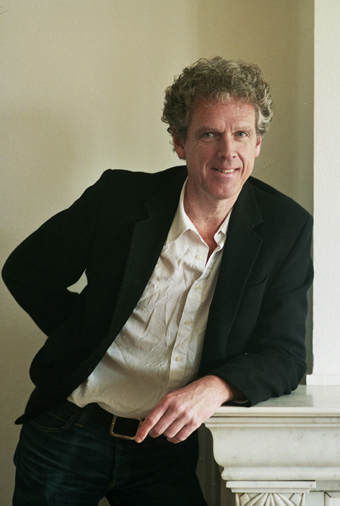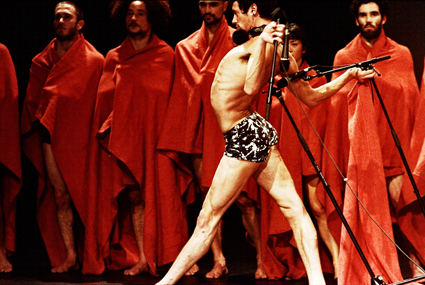transforming the artist & the audience
martin del amo: interview alain platel, spring dance

Alain Platel
photo Chris Van der Burght
Alain Platel
FOR SOMEONE WHO IS RECOGNISED AS ONE OF THE GREAT EUROPEAN THEATRE PROVOCATEURS OF THE LAST 20 YEARS, HAILED FOR PRODUCTIONS THAT SHOW EVERYDAY LIFE IN ALL ITS IMPERFECTION AND FRAGILITY, BELGIAN CHOREOGRAPHER ALAIN PLATEL APPEARS SURPRISINGLY MILD-MANNERED AND SERENE IN CONVERSATION. SOFT-SPOKEN YET ARMED WITH THE MISCHIEVOUS SMILE OF A TEENAGER, HE EXUDES THE AIR OF A MAN WHO, AT 55, HAS NEVER STOPPED ASKING QUESTIONS, NOT LEAST ABOUT HIS ROLE IN THE SCHEME OF THINGS.
In Australia to present his Les Ballets C de la B work, Out of Context—for Pina at Sydney Opera House’s Spring Dance and Brisbane Festival, Platel is pleased to discover that at the former the piece is accompanied by a series of films and talks celebrating the life and work of legendary choreographer Pina Bausch—a fitting context for his work. The idea for Out of Context came to Platel when returning to Belgium after a commemorative service for Bausch in Wuppertal. He wanted to give her a “present.” Platel says: “Ever since I met Pina at the end of the 90s, she no longer was only this famous choreographer but also became an extremely important human being in my life, somebody I was very inspired by.” Citing her work Café Müller (1978) as one of the dance pieces that changed his life, Platel credits Bausch with influencing the way he watches theatre: “I think what she did for me was to intensify my looking at things…to enjoy looking at people.”
It is interesting to note that like Bausch, Platel did not set out to explore an existing performance language but developed a style of his own by pursuing a line of inquiry that originated in asking questions he was personally interested in. Originally, he trained as a remedial educationalist working with children with motor and multiple disabilities. Founding the Ghent-based theatre collective les ballets C de la B in 1984, Platel describes himself as an autodidact director and a reluctant one at that. It took him five years, he admits, before changing jobs and starting to call himself a professional theatre maker: “In the first few years, we didn’t have the ambition to become big stars or tour the world. We were just having fun. Our first performances, you know, we performed only four or five times in front of about 400 people. And that was a lot for us at the time.”
However, Platel’s exuberant productions, with their eclectic casts of professional and non-professional performers from culturally and socially diverse backgrounds, wildly mixing high and lowbrow cultural references, soon captured the imagination of audiences throughout Belgium. The international breakthrough followed in the mid-90s and resulted in extensive, worldwide touring of shows such as La Tristeza Complice (1995) and Iets Op Bach (1998). Platel insists that the driving force behind those large-scale, multi-cast works was his interest in finding out how to communicate politically and philosophically complex themes on stage. This motivation has sometimes been misunderstood, much to Platel’s disappointment: “It makes me sad when I get asked, ‘do you really want to shock people?’ Because I don’t think I have ever had any intention to shock or provoke. To confront audiences with difficult images to look at, yes, but when I show images that are difficult to cope with it’s because I don’t know how to cope with them myself. And I want to share that. I think the theatre is the place where you can do this. Much more than in any other place.”

Out of Context-For Pina, Les Ballets C de la B
photo Chris Van der Burght
Out of Context-For Pina, Les Ballets C de la B
After several years of international success, Platel found the pressure to live up to the reputation and hype surrounding Les Ballets C de la B increasingly difficult. His announcement in 1999 that he would stop making work sent shockwaves through the European theatre scene. He reflects, “I must say I was surprised that people took it so dramatically seriously.” Laughing, he adds, “I shouldn’t have told anybody. But I was really thinking at the time, can I do something else besides making theatre? Should I continue to do this for the rest of my life? I just couldn’t cope any longer with the pressure that was around me in terms of making each year a new success.’’
In the end, his break from theatre-making only lasted a little more than two years before returning to the fold. For Platel, however, it was a significant period, from which he emerged with new-found clarity. “It helped me redefine my position and reflect on how to continue. I now cope better with the whole ‘business.’ I think I take it a little bit less seriously. The pressure is still there but in another way. I am not taken by it. I don’t feel the need to make new work all the time any more. That is a nice thing to realise.” His time away from the theatre also spawned a new approach to choosing the next project, Platel explains: “Now when I decide to do things, it’s a gut feeling, like I have to do it. I want to make it a life experience, not just something along the lines of ‘let’s do a project together’.”
So, with Les Ballets C de la B celebrating its 25th anniversary this year, how has Platel’s view of the role of theatre in society changed over the years? He concedes, “Maybe there was a moment once where I thought we were going to conquer the world and make a difference but I very quickly realised that this was too big a mission.” He laughs. “I read in the paper one day that only 1% of the Belgian population goes to see theatre. So I think it’s pretty difficult to change the world by making performances.” Fair enough. But still, when talking to Platel one can’t shake the feeling he hasn’t given up on the transformative power of theatre altogether: “I have feedback from many people who have witnessed our performances and you feel that a performance can continue to live in someone’s life for a very long time. That is quite surprising. And sometimes, so people tell me, it has an effect on how they live their lives. That is really something.”
Platel admits to often being touched by audience reactions and drawing inspiration from them: “We showed Out of Context in Taipei this year and we performed in this huge theatre, 1500 seats. On the day of the first performance I was walking around the city and thinking, who on earth in this city would think about coming to the theatre tonight to see a performance by Alain Platel. Who the hell is Alain Platel? There are so many things in this city that one can do in the evening. But then the theatre was completely full, on both nights. And not only that but the people really liked the show and were very expressive about it. I had never been there in my life. And this is something that makes me very emotional.” Considering that Alain Platel is so often associated with shocking audiences, his next remark is not without irony: “Thinking back to how we started out and how I didn’t know anything about making theatre, a story like this is really shocking to me. Absolutely shocking.”
Les Ballets C de la B’s Out of Context—for Pina appeared in Spring Dance 2011, Sydney Opera House where he also spoke and conducted a masterclass. See reviews in RT105 and RT98.
RealTime issue #106 Dec-Jan 2011 pg. 26






